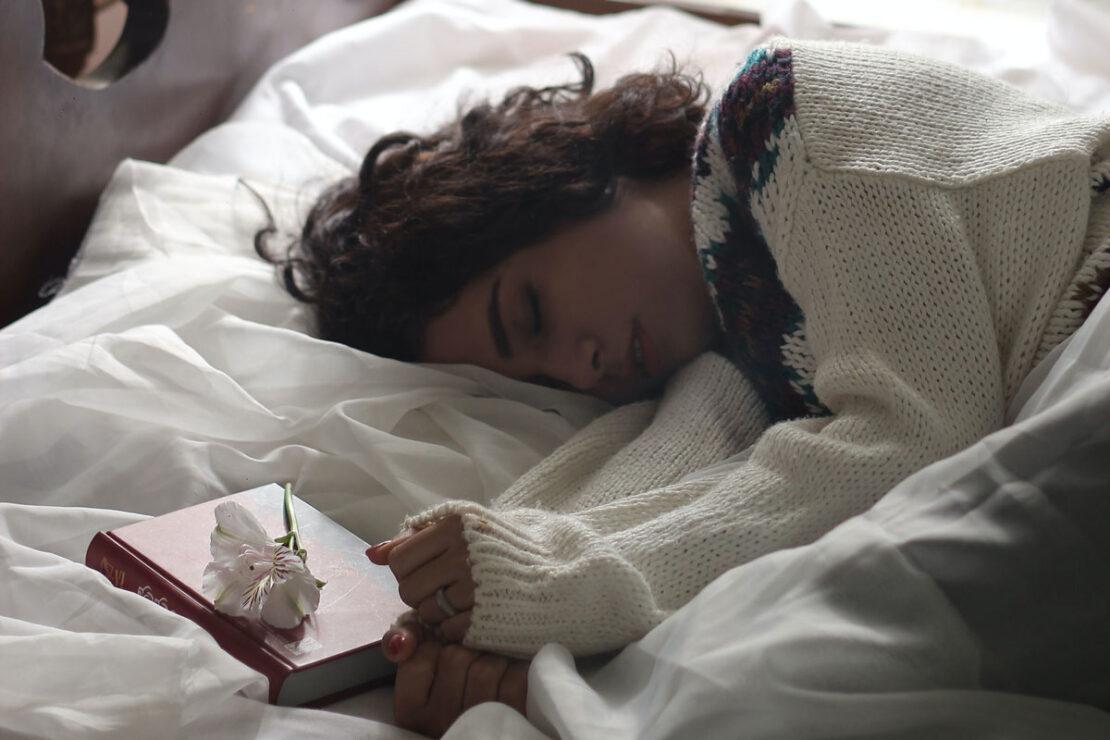
Essential Oils for Sleep: Aromatherapy and Insomnia
It’s amazing how certain aromas can help boost our alertness or calm our stress. But is it true that essential oils like lavender, patchouli, or marjoram could even help us get a good night’s sleep? There is research to suggest that aromatherapy can help reduce insomnia. In this article, you will learn about the scientific evidence demonstrating scents’ effectiveness for improving sleep across a variety of populations. You’ll also find a few easy tips on how to enjoy some of your favorite essential oils for sleep.
How Can Essential Oils Improve Sleep?
Aromas can impact our central nervous system immediately through a psycho-olfactory relationship. Many essential oils demonstrate a pleasant sedative effect when inhaled. Certain aromas have even been shown to lower heart rate, calm breathing, and reduce saliva cortisol levels associated with stress.
While each person may have a unique response to aromas, here are few essential oils noted for supporting restful and pleasant sleep.
- Clary sage (Salvia sclarea)
- Geranium (Pelargonium graveolens)
- German chamomile (Matricaria recutita)
- Lavender (Lavandula angustifolia)
- Marjoram (Origanum majorana)
- Neroli (Citrus x aurantium)
- Patchouli (Pogostemon cablin)
- Vetiver (Vetiveria zizanioides)
- Virginia cedarwood (Juniperus virginiana)
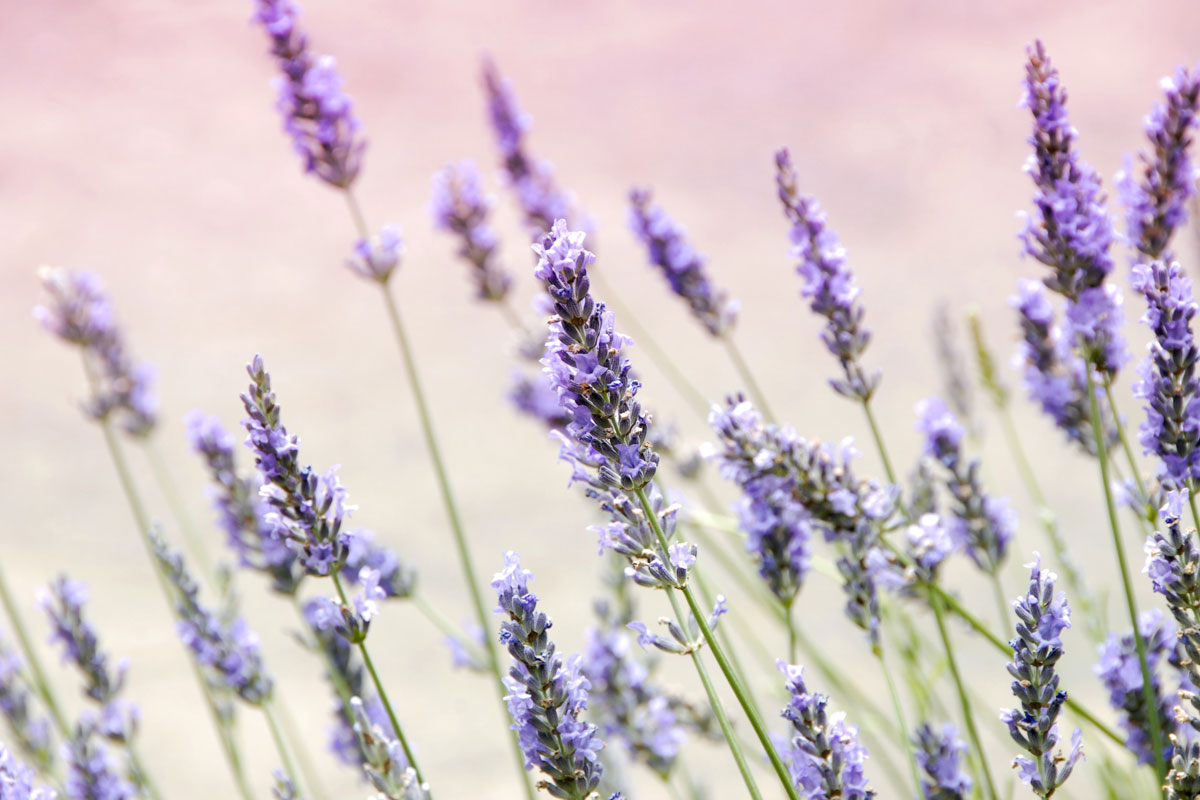
Using Aromatherapy for a Good Night’s Sleep
Nighttime aromatherapy can be enjoyed in a variety of ways. Here are a few ideas for healthy adults.
- Essential oils for sleep can be dispersed in the air with a diffuser for about 10 minutes before bedtime. Enjoy a single note like lavender (Lavandula angustifolia). Or, try a blend with lavender (Lavandula angustifolia), geranium (Pelargonium graveolens), and neroli (Citrus x aurantium) in a 6:2:0.5 ratio. Dilute following the instructions for your diffuser unit.
- A few drops of essential oil can be placed on a cloth or sachet to set next to the bed. My favorite nighttime mix to try is a combination with equal parts of lavender (Lavandula angustifolia), marjoram (Origanum majorana), and juniper berry (Juniperus communis).
- Diluted essential oils in a carrier oil (10 drops of essential oil per ounce of carrier oil) can be applied to the wrist area. Try mixing 5 drops of lavender (Lavandula angustifolia), 4 drops of patchouli (Pogostemon cablin), and 1 drop of vetiver (Vetiveria zizanioides) essential oils with one ounce of sweet almond carrier oil.
- Diluted essential oils can be enjoyed in a bath just before bed. Mix 10 drops of essential oil with an ounce of carrier oil in bathwater. I like a bath blend with 5 drops of clary sage (Salvia sclarea) and 5 drops of German chamomile (Matricaria chamomilla) mixed in an ounce of jojoba carrier oil.
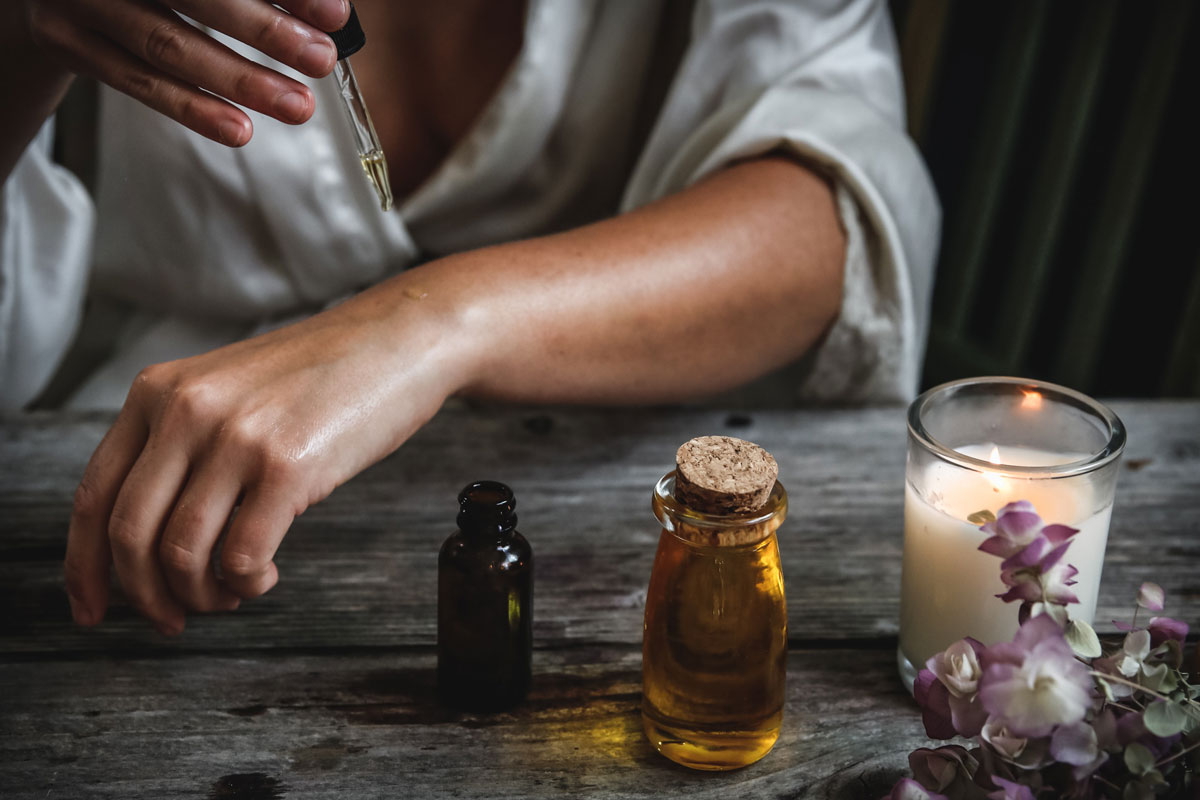
Safety: Avoid prolonged use of diffusers. Overexposure via inhalation can cause unpleasant side effects such as a headache, nausea, or an elevated heart rate. Diffuse intermittently for short 5 to 20-minute periods in open rooms with proper ventilation.
Avoid skin contact with undiluted oils. Skin patch test before using essential oils if you have sensitive skin.
Certain essential oils can be contraindicated with certain health conditions or around babies and animals. Ask your Doctor or Veterinarian if you have any questions before using a new essential oil in your household.
Scientific Studies on Essential Oils for Sleep
Aromatherapy before or during sleep has shown to help ease insomnia. Many of the aromatherapy studies are smaller, so more research may be needed. However, the evidence is encouraging! Here are a number of studies that demonstrate the connection between essential oils and sleep, with a focus on populations that are commonly challenged with getting a good night’s rest.
Older Adults
- Older adults in a 30-day study seemed to benefit when using aromatherapy for sleep. Among 150 participants, those in the treatment group received a nightly aromatherapy blend of lavender (Lavandula angustifolia), geranium (Pelargonium graveolens), marjoram (Origanum majorana), and basil (Ocimum basilicum) which helped reduce the intensity of insomnia (Jezdic et al., 2018).
- Elderly women who volunteered to try aromatherapy for sleep may have benefited also. In a 4-week placebo-controlled study with 70 volunteers, an aromatherapy necklace worn to bed included two essential oils for sleep: orange (Citrus x sinensis) and marjoram (Origanum majorana). The scents were shown to improve sleep quality and duration and reduce anxiety when combined with a simple sleep improvement program (Chun & Kim, 2017).
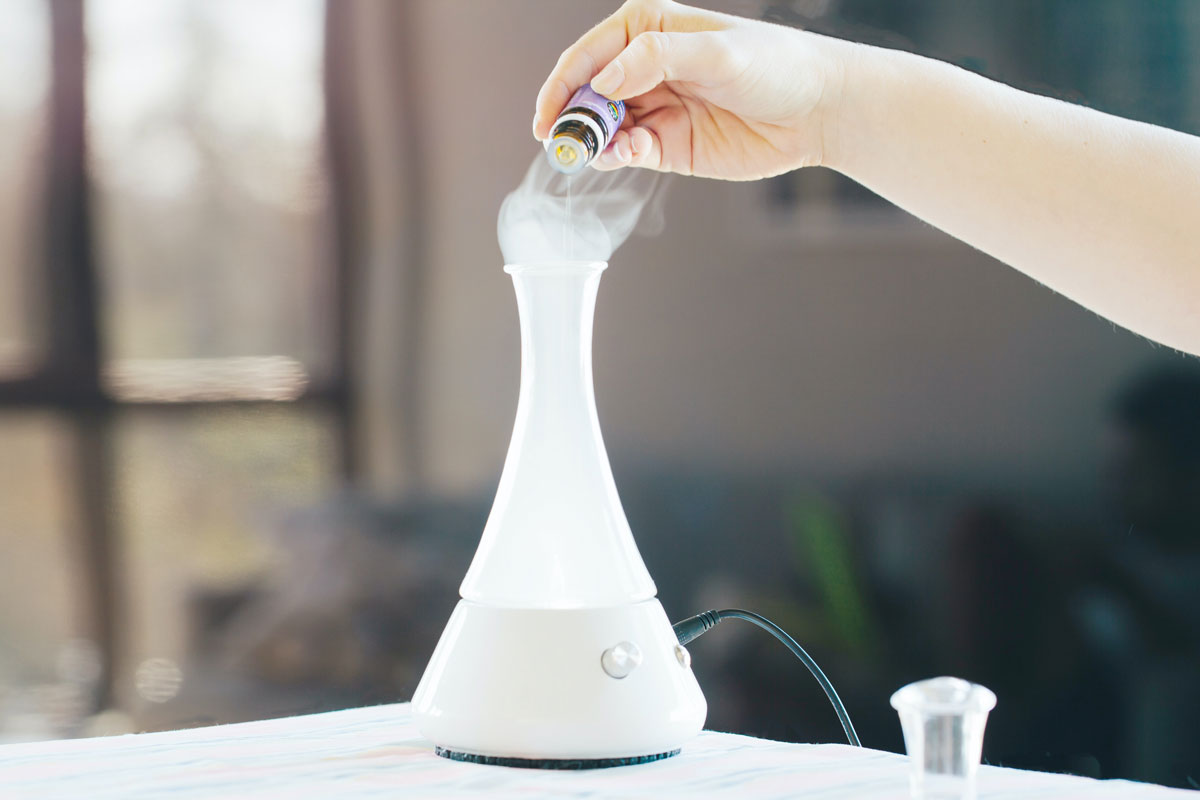
Patients with Insomnia or Chronic Stress
- Patients with chronic stress may have benefited from aromatherapy inhalation. A daily intranasal administration containing diluted lavender (Lavandula angustifolia) and fennel (Foeniculum vulgare) essential oils reduced cortisol levels associated with stress and improved quality of sleep. This was a three-month randomized, double-blind study with 45 anxiety patients (Polonini et al., 2020).
- Insomnia patients in a small study experienced improved sleep quality after inhaling lavender (Lavandula angustifolia) essential oil each night for four weeks (Lewith et al., 2005).
Students / Young Adults
- Young adults in a short length study experienced sleep promotion from inhaling lavender (Lavandula angustifolia) aroma for just two minutes in a three-nights study. (Goel, et al., 2005).
- College-aged nursing students with insomnia seemed to experience beneficial effects; with a reduction in symptoms of both insomnia and depression, in a 4-week study with 42 students (Lee & Lee, 2006).
- Nighttime exposure to lavender (Lavandula angustifolia) aroma also reduced morning sleepiness in a group of young adults, in a group of 15 subjects (Hirokawa et al., 2012).

Menopausal Women
- Post-menopausal women with diagnosed insomnia who inhaled lavender (Lavandula angustifolia) aroma prior to bedtime while also following sleep hygiene instructions experienced improved sleep quality. This was a one month long study of 33 women (Lucena et al., 2020).
- In a study of 67 women aged 45-55 years with insomnia, the aromatherapy group had improved quality of sleep. They received lavender (Lavandula angustifolia) inhalation for 20 minutes twice per week for 12 weeks, totaling 24 treatments (Chien et al., 2011).
Type 2 Diabetes Patients
- Aromatherapy application of lavender was tested in a group of patients with type II diabetes. Lavender (Lavandula angustifolia) inhalation improved sleep quality, quality of life, and mood in those of the 37 patients in the clinical study who received lavender (Lari et al., 2020).
ICU Patients
- Aromatherapy applications have even been tested for care of sleep quality in patients in the intensive care unit. In a controlled study of 56 intensive care unit patients, the group receiving an aromatherapy blend with lavender (Lavandula angustifolia), Roman chamomile (Anthemis nobilis), and neroli (Citrus x aurantium) in a 6:2:0.5 ratio, showed reduced anxiety and improved sleep quality (Cho et al., 2013).
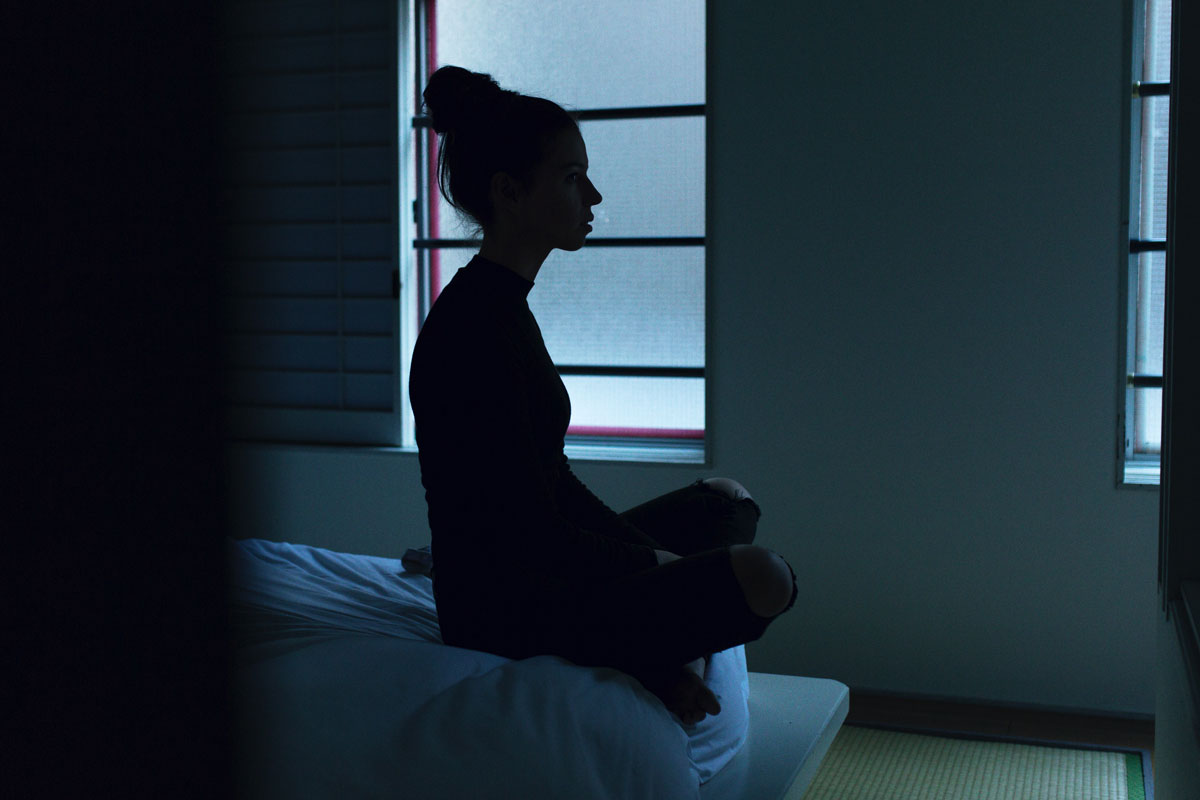
Can Aromatherapy Help With Insomnia?
Aromatherapy has shown in a variety of studies to help improve sleep quality. Lavender is one of the most researched essential oils, with several others also showing to have a sedative effect. Your use of essential oils for sleep should be based on your personal preference. Pick the single note or blend that puts you at ease to get a good night’s sleep!
For more helpful resources about getting a good night’s sleep, see:
5 Herbal Insomnia Options for Better Sleep
Herbal Sleep Cycling: How to Create Your Own Protocol for Deeper Sleep
5 Lifestyle Hacks for Sound Sleep
How to Use Mugwort for Dreams, Sleep, and More
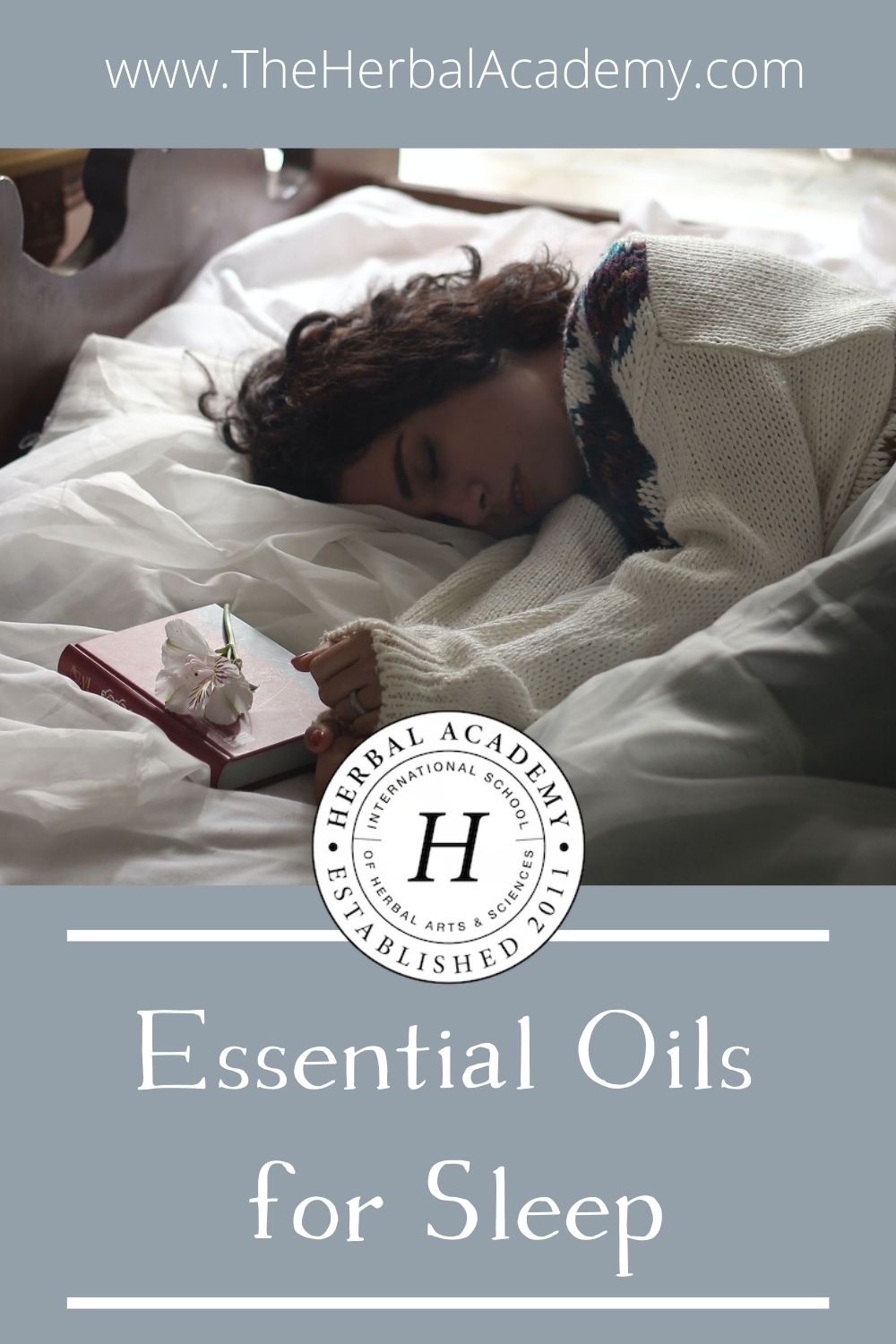
REFERENCES
Chien, L. W., Cheng, S. L., & Liu, C. F. (2011). The effect of lavender aromatherapy on autonomic nervous system in midlife women with insomnia. Evidence-Based Complementary and Alternative Medicine. https://doi.org/10.1155/2012/740813
Cho, M. Y., Min, E. S., Hur, M. H., & Lee, M. S. (2013). Effects of aromatherapy on the anxiety, vital signs, and sleep quality of percutaneous coronary intervention patients in intensive care units. Evidence-Based Complementary and Alternative Medicine, 381381.https://doi.org/10.1155/2013/381381
Chun, N., & Kim, M. (2017). Effects of a sleep improvement program combined with aroma-necklace on sleep, depression, anxiety and blood pressure in elderly women. Journal of Korean Academy of Nursing, 47(5), 651-662. https://doi.org/10.4040/jkan.2017.47.5.651.
Goel, N., Kim, H., & Lao, R. P. (2005). An olfactory stimulus modifies nighttime sleep in young men and women. Chronobiology International, 22(5), 889-904. https://doi.org/10.1080/07420520500263276
Hirokawa, K., Nishimoto, T., & Taniguchi, T. (2012). Effects of lavender aroma on sleep quality in healthy Japanese students. Perceptual and Motor Skills, 114(1), 111-122. https://doi.org/10.2466%2F13.15.PMS.114.1.111-122
Jezdic, Z., Vulinac, S. O., Racz, A., Kovacevic, I., Sedic, B., & Jadranka, P. (2018). Influence of aromatherapy on alleviation of insomnia symptoms. Complementary and Alternative Medicine: Open Access, 2018(2), 1-5. https://doi.org/10.9016/CAM-103/10000103.
Lari, Z. N., Hajimonfarednejad, M., Riasatian, M., Abolhassanzadeh, Z., Iraji, A., Vojoud, M., … Shams, M. (2020). Efficacy of inhaled Lavandula angustifolia Mill. essential oil on sleep quality, quality of life and metabolic control in patients with diabetes mellitus type II and insomnia. Journal of Ethnopharmacology, 251, 112560. https://doi.org/10.1016/j.jep.2020.112560
Lee, I. S., & Lee, G. J. (2006). Effects of lavender aromatherapy on insomnia and depression in women college students. Journal of Korean Academy of Nursing, 36(1), 136-143.
Lewith, G. T., Godfrey, A. D., & Prescott, P. (2005). A single-blinded, randomized pilot study evaluating the aroma of Lavandula angustifolia as a treatment for mild insomnia. Journal of Alternative & Complementary Medicine, 11(4), 631-637. https://doi.org/10.1089/acm.2005.11.631
Lucena, L. R., Santos-Junior, J. G., Tufik, S., & Hachul, H. (2020). 0498 Effect of lavender essential oil on sleep in postmenopausal women with insomnia: Double-blind randomized controlled trial. Sleep, 43(1), A190-A191. https://doi.org/10.1093/sleep/zsaa056.495
Polonini, H., Mesquita, D., Lanine, J., Dijkers, E., Gkinis, S., Raposo, N. R. B., … de Oliveira Ferreira, A. (2020). Intranasal use of lavender and fennel decreases salivary cortisol levels and improves quality of sleep: A double-blind randomized clinical trial. European Journal of Integrative Medicine, 34, 101015. https://doi.org/10.1016/j.eujim.2019.101015









